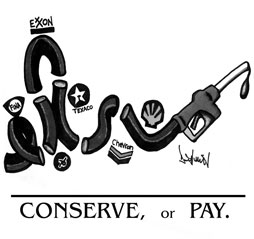 Consumers are getting a break at the gas pump, finally, and most analysts agree prices should remain stable for a while.
Consumers are getting a break at the gas pump, finally, and most analysts agree prices should remain stable for a while.
But Americans should remain aware of the volatility of the crude oil market and the need for conservation and development of alternative energy sources.
Neither American consumers nor manufacturers took progressive steps during the “gas crisis” of the 1970s and were caught unprepared for the latest energy crunch. Foreign automakers were ready and beat the “Big Three” to the alternative fuels car market with efficient hybrids.
Although prices have dropped below $2 at many area stations, the need to save money is not the only reason Americans should be watchful of their gas usage. The U.S. Environmental Protection Agency at www.fueleconomy.gov gives additional reasons to monitor fossil fuel consumption.
Cutting back on usage protects the environment; no one looks forward to ozone alert days or even hotter summers. In addition, the more fuel transported and refined, the greater the opportunity of fuel spills and refinery explosions.
Conservation will allow the present fuel supply to last longer, providing more time for the development of alternatives without putting an unnecessary strain on the American people or economy.
Opinions vary on how long the supply of fossil fuels will last, but everyone agrees that the supply is not unlimited and will eventually run out.
In addition, the EPA says conservation strengthens national energy security by reducing American dependence on foreign oil, pointing out that more than half of the gas used to run American automobiles is imported.
Some countries are rapidly beating the U.S. on conservation efforts. Mass transit is commonly used in most of Europe’s major cities. Carpooling, bikes and old-fashioned pedestrian power are widespread practices worldwide.
Brazil has developed ethanol fuel derived from sugarcane and plans to be foreign oil independent by the end of 2007.
Professor Emilio La Rovere, of the Federal University of Rio de Janeiro, said in an article that the Brazilian sugarcane industry saw the worldwide demand for sugar decreasing and worked to develop the fuel with the aid of government subsidies.
The drive toward ethanol began in 1973 during the “gas crisis,” and today 70 percent of new vehicles sold in Brazil are “flex” fuel. They run on gasoline-ethanol blends or 100 percent ethanol, which Brazilian gas stations have been mandated by government to provide since the ’70s.
In addition, the fuels burn cleaner than gasoline.
Americans can learn from this example and explore every possible avenue to independence from fossil fuels. Thirty-four years have been lost to complacency and reliance on “big oil.”
With diligent preparation, the United States will never experience another energy crisis.
























